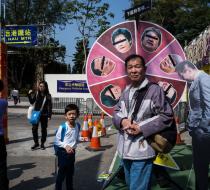Wheel of Misfortune Favorite
Hong Kong’s Lunar New Year fairs draw thousands of visitors who stroll past stalls of potted narcissus, snack on fish balls and snap up the latest plush toys. In recent years, the largest of the fairs, at Victoria Park, has also become a prime site for political expression.
Two years ago, after street protests failed to achieve greater public participation in the selection of the leader of Hong Kong, a semiautonomous Chinese territory, some holiday stalls offered clothing and other items carrying pointed messages of resistance. This year — before the March election of the leader in which the outcome will, as usual, be decided by pro-Beijing loyalists voting on a short list of vetted candidates — defiance appears to have given way to indignant resignation.
“I feel so helpless that as a Hong Konger, as a citizen, I don’t even have a vote,” said Priscilla Pang, a 22-year-old student, frowning at a wheel of fortune featuring the faces of several potential candidates for the leader, or chief executive. Given a choice, she would pick none of them, she said. “We’re like chickens having food forced down their throats. There’s no use fighting.”
The wheel of fortune was set up by the pro-democracy Civic Party to highlight the closed nature of the election, said Alvin Yeung, the party leader and a legislator.
“Most of the Hong Kong people who came and played the wheel, they don’t have the right to vote,” Mr. Yeung said. “We allow people to take their turn and see who will be the one, but at the end of the day our message is, ‘None of them are your real choice because this election is not a genuine election.’”
Nearby, a stall run by the Democratic Party was selling a modified version of Fish, Prawn, Crab, a Chinese game of chance. It, too, featured the expected candidates, with the winners determined by a roll of the dice. The point was that whichever candidate won, it was from the same restricted pool.
“Most people here will not be able to participate whatsoever,” said Helena Wong, a member of the Democratic Party, as she finished a “fai chun’’ — good wishes written in Chinese calligraphy on red paper — for display. “They can at most have fun playing the game.”
The declared candidates include three former government officials and a retired judge. All except the former judge, who is given little chance of winning, have embraced the strict framework the Chinese government imposed in 2014 for changes to Hong Kong’s election rules. It allowed the chief executive to be elected, for the first time, by a popular vote. But the list of candidates would still be chosen by a pro-Beijing committee. It was that decision that led to the months of protests in Hong Kong, later known as the Umbrella Movement, calling for “genuine” universal suffrage.
“At Hong Kong New Year Fair, Defiance Gives Way to Resignation”
New York Times
ALAN WONG JAN. 27, 2017







